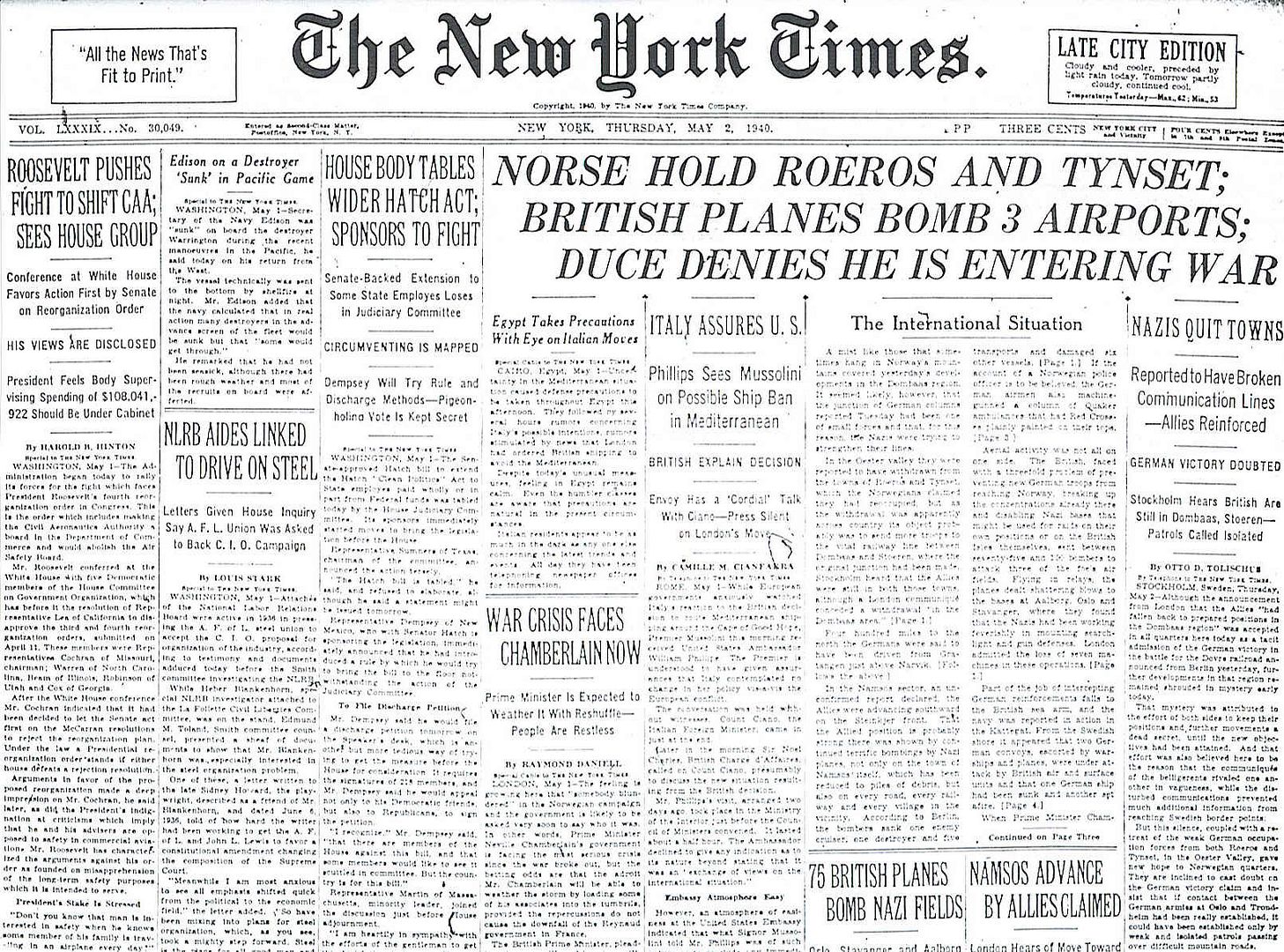
Posted on 05/02/2010 6:14:12 AM PDT by Homer_J_Simpson

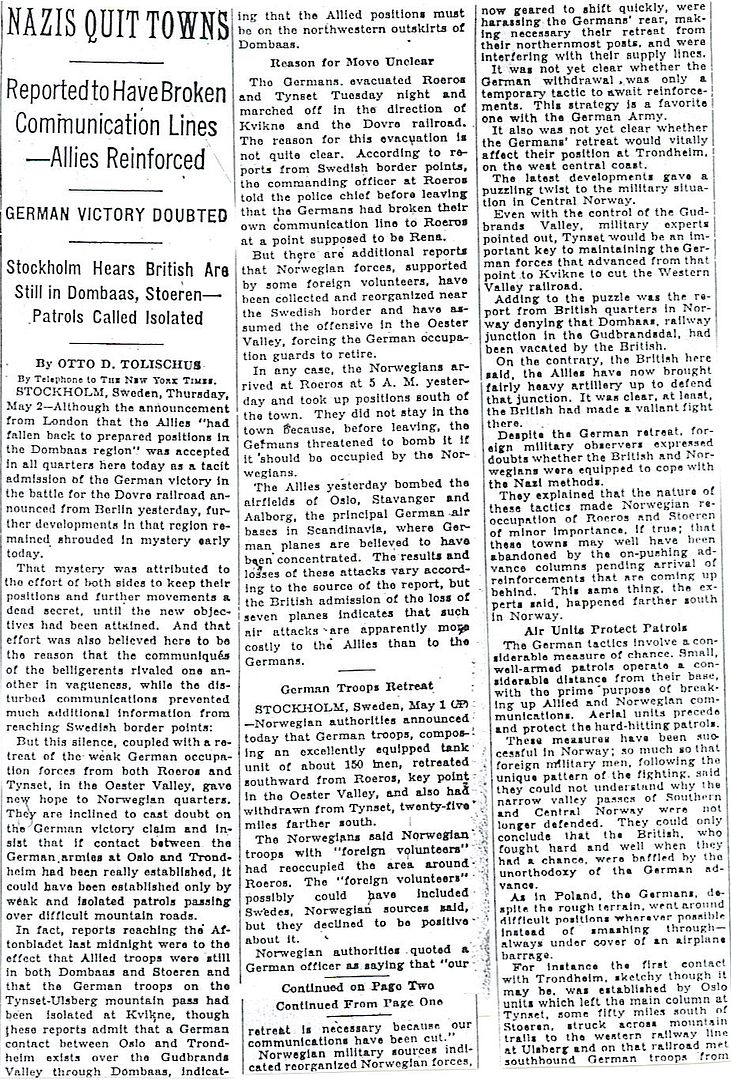
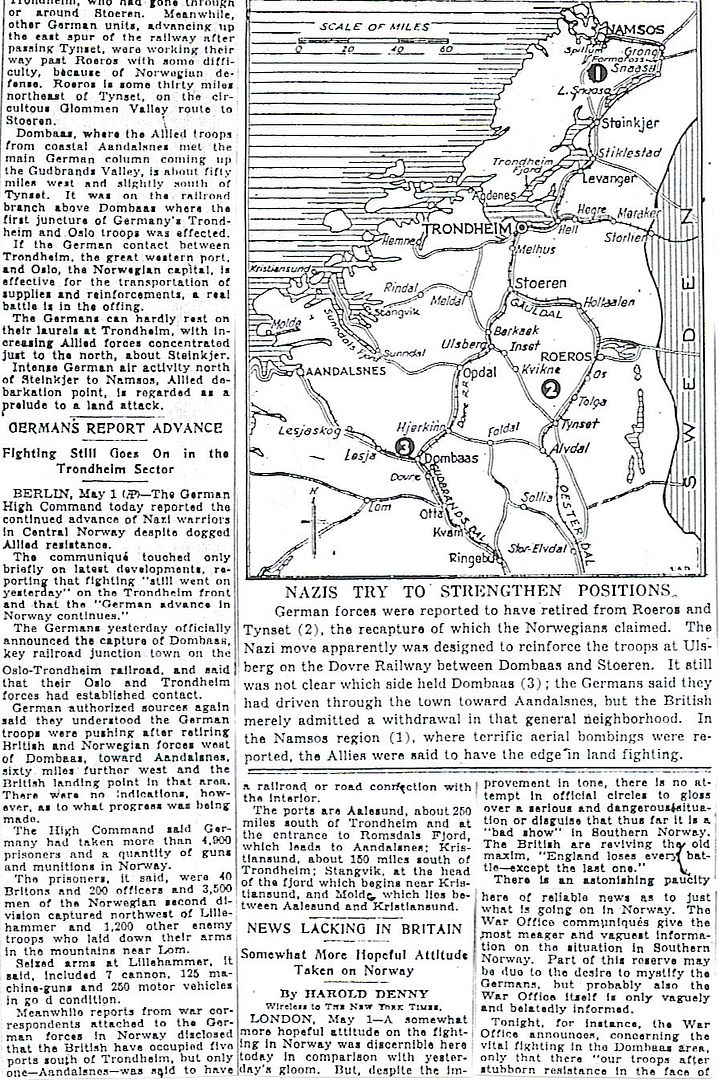
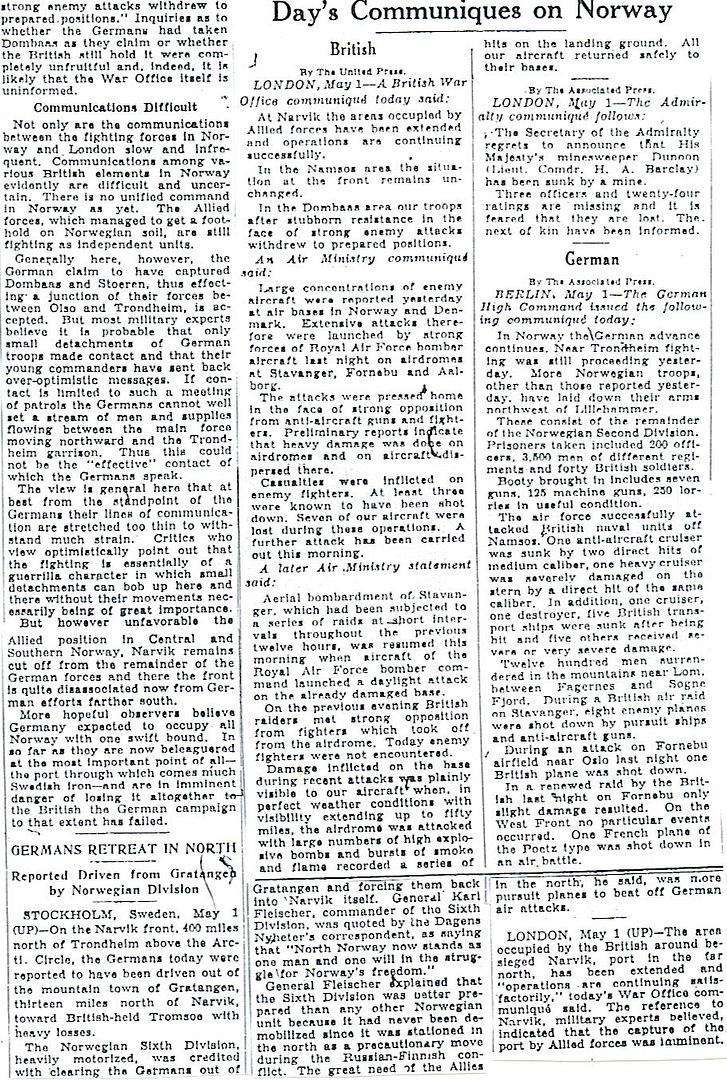
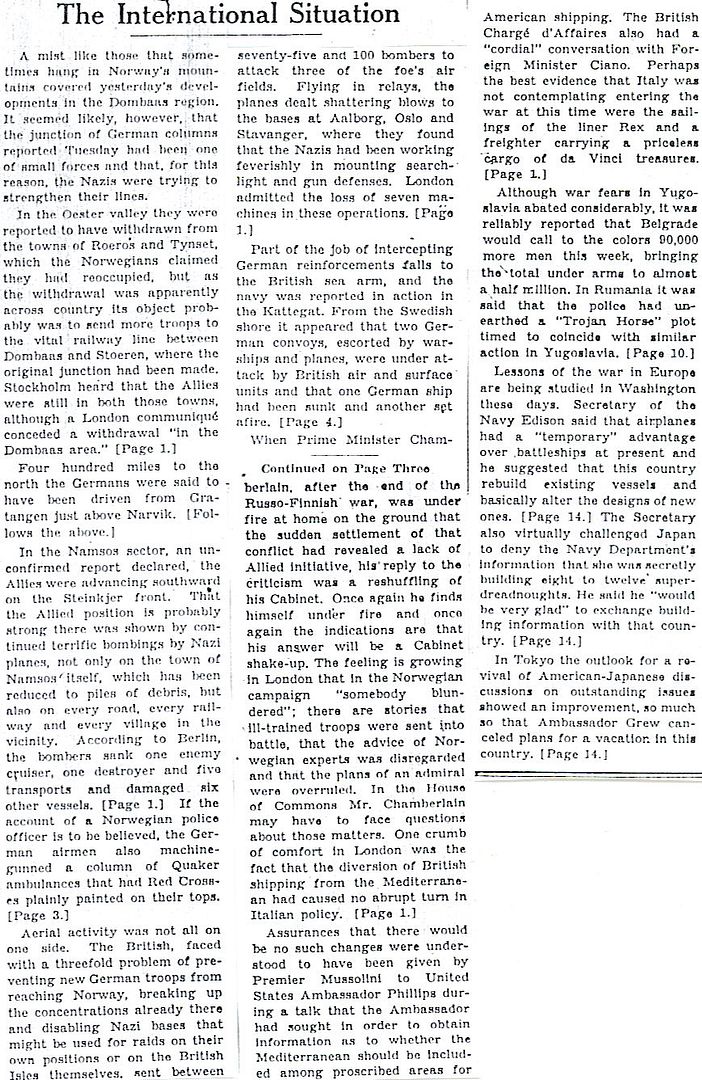
http://www.onwar.com/chrono/1940/may40/f02may40.htm
Allies attempt to isolate Narvik
Thursday, May 2, 1940 www.onwar.com
In Norway... The Germans reach Andalsnes. The Allies begin to leave Namsos. Before dawn 5400 British and French troops have been evacuated. Small British and French forces are landed at Mosjoen to try to help block the road north to Narvik.
May 2nd, 1940
UNITED KINGDOM:
RAF Bomber Command: 4 Group. Bombing - Stavanger and Fornebu airfields.
51 Sqn. Six aircraft. All bombed Fornebu. Severe opposition. One crew abandoned aircraft on return.
58 Sqn. Six aircraft to Stavanger. One returned U/S, four bombed. Light opposition.
Blenheims of 107 Sqn. raid Stavanger and Rye aerodromes in daylight. Wellingtons raid Rye at night.
RAF Coastal Command: Escorting ships evacuating British forces from Norway.
Destroyer ORP (ex-HMS) Garland commissioned. (Dave Shirlaw)
NORWEGIAN CAMPAIGN: Namsos, Norway. Lt. Richard Been Stannard (1902-77), RNR, of HMS Arab (trawler of 15th A/S Striking Force), showed great courage during 31 attacks on his ship from 28 April to 2 May, in one case saving a jetty ablaze from burning ammunition, and is awarded the VC.
Under heavy Luftwaffe bombardment, Allied forces start to evacuate Namsos; 5,400 soldiers embark today. The evacuation of Mauriceforce is scheduled for the nights of May 1 and 2. A dense offshore fog settled in yesterday and most of the French and British relief ships lay to, waiting for it to lift. General Carton de Wiart, unaware of the offshore weather, had all his men out of hiding and waiting down by the battered docks. Morning found them still waiting. There was barely time to get them back under cover before the first German reconnaissance planes arrived at daylight. Not until late today does the fog lift and the rescue begin.
Åndalsnes: After midnight the last available cruiser edged in, expecting to retrieve a 240 man read guard - and instead found almost 1,000 soldiers waiting on the dock. All of them crammed aboard, and by 2 a.m. on May 2 the last of Sickleforce’s survivors were away. Behind them they left 1,402 men of the 148th and 15th Brigades, either killed, wounded or POW. This afternoon when advance elements of the German 196th Division march into Åndalsnes, they found the port ruined by bombs of the Luftwaffe - and empty of British troops.
HMS Ark Royal and HMS Glorious, in company with battleship HMS Valiant, heavy cruiser HMS Berwick, and destroyers HMS Fury, HMS Encounter, HMS Escort, HMS Fearless, HMS Acheron, HMS Antelope, HMS Fortune, and HMS Kimberley continue to steam towards Scapa. HMS Furious in dockyard hands at Greenock. (Mark Horan)
ITALY: Rome: Mussolini proposes a bargain with Roosevelt; he will refrain from invading the USA if the President keeps America out of the war in Europe.
CANADA: Corvette HMCS Collingwood laid down Collingwood, Ontario. (Dave Shirlaw)
.
As the allies evacuate Norway, and May 9 - 10 approaches with Hitler's Fall Gelb "Case Yellow," we might take note of Patrick Buchanan today on C-Span again defending his 2008 book, "Churchill, Hitler and the Unnecessary War."
I've argued here that Buchanan's logic, while interesting, is based on several false premises. Among them are:
No. The German Kaiser and military wanted the First World War in 1914 -- no later -- because they believed Russia was quickly becoming too powerful to defeat.
Neither Serbia, Russia nor France declared war on Germany. And, none attacked until after Germany declared war and unleashed its "Schlieffen Plan."
So the only way for the Allies to avoid prolonged war in 1914 was immediately accept defeat by Germany.
No. Based on peace terms Germany imposed on countries it defeated -- i.e., Belgium in 1914 and Russia in 1917 -- the Versailles terms were totally just and expected for a defeated nation.
Indeed, Germany received the least harsh treatment of all the defeated empires.
So the problem was not "unjust terms," but rather: the Germans did not feel defeated, and soon convinced themselves they had not been defeated, indeed, had never lost a battle, and so justice naturally demanded a "round two."
Easy for Churchill to say, since in his mind (and ours) blame fell entirely on Chamberlain and his Appeasement policy.
But Buchanan wants us to shift the blame from Chamberlain's appeasement to Churchill's defense of the British Empire.
Well, in Chamberlain's defense, he had taken Hitler's measure, judged Hitler a untrustworthy madman, and learned from bitter experience that to appease one Nazi demand after another was simply to invite more and more unreasonable demands.
It had to be stopped somewhere, and since that could not be Czechoslovakia, it must be Poland.
Chamberlain was fully prepared to negotiate minor adjustments to Versailles, but not to turn all of Europe over to Hitler.
Churchill, of course, had argued all along there was no way to appease Hitler, he must be opposed.
But that would also mean those parts of France which Germany conquered -- and in which Corporal Hitler had served -- during the First World War. Such an outcome would have converted its Great War defeat into total victory -- an outcome which millions of young French and Brits had died to prevent.
Such an outcome was unthinkable to Neville Chamberlain, and to any reasonable person since.

No, even after the crushing defeat of France, Hitler never sought the return of the European German territories given to France after the first World War.
Hitler did seek the return of the German colonies split up among the winners.
Much of the carnage of World War II in Western (and even Central) Europe could have been avoided if the west had done two things - forced the Poles into accommodating the demands of Germany for free access to Danzig and a common front against the true enemy, and more importantly, put aside (with the American elite) the antisemitism that prevented giving refuge to the Jews.
On Poland -- Hitler was never going to find a better negotiating friend than Neville Chamberlain.
Chamberlain was fully prepared to appease any reasonable demands Hitler made.
But when Hitler scr*wed Chamberlain over, big time, in Czechoslovakia, Chamberlain said, in effect: "never again."
The problem, of course, is that Hitler was not a dependable negotiating partner.
Indeed, what Hitler wanted was war, and is reported as disappointed that he didn't get war with Chamberlain at Munich in 1938.
So the issue was never: "could war be avoided?" but rather, "how much do the allies have to give in before finally drawing a line that will lead to war?" In 1939 Chamberlain thought he had given up enough already, and would soon be ready to confront Hitler.
As for refuge for Jews: most of the refugees who arrived in the US during that period -- late 30s to early 40s -- were Jews.
President Roosevelt did everything he could to both increase the number of Jews arriving here and to encourage other countries to accept Jewish refugees.
And his program was successful, in that nearly all German Jews and most Austrian Jews did escape before the war.
But the problem was that most went to countries like Holland (i.e., Anne Frank), and once overrun by German armies had no further chances to escape Hitler's clutches.
About those millions of Polish and other Eastern European Jews who died in the Holocaust -- there was never a suggestion or plan for them to immigrate here before the war. And once war began, Hitler closed the door on them.
http://worldwar2daybyday.blogspot.com/
Day 245 May 2, 1940
Vice-Admiral John Cunningham’s flotilla (3 cruisers, 5 destroyers & 3 transports) joins Mountbatten’s 4 destroyers off Namsos to evacuate General de Wiart’s 146th Brigade. However, yesterday’s evacuation at Åndalsnes alerted the Luftwaffe to British intentions at Namsos. Bombing runs start as the destroyers move up the Namsenfjord to begin embarking troops. HMS Maori is damaged by a near miss (5 lives lost, 18 wounded), delaying the operation until weather or nightfall blinds the Luftwaffe to their activities. In the evening heavy fog comes in and the destroyers safely ferry 5350 men out to the cruisers & transports overnight. 146th Brigade has lost 153 men killed or captured.
While the French & British are distracted by events in Norway and withdraw troops from the Western Front, Hitler prepares for his knockout punch against the Allies. 93 front-line divisions (including 10 armored & 6 motorised) are assembled to invade Northern France and the Low Countries (Fall Gelb).
Oh really? Say, I'd hate to give away too much of the story before we even get there, but perhaps you can explain this map to us?
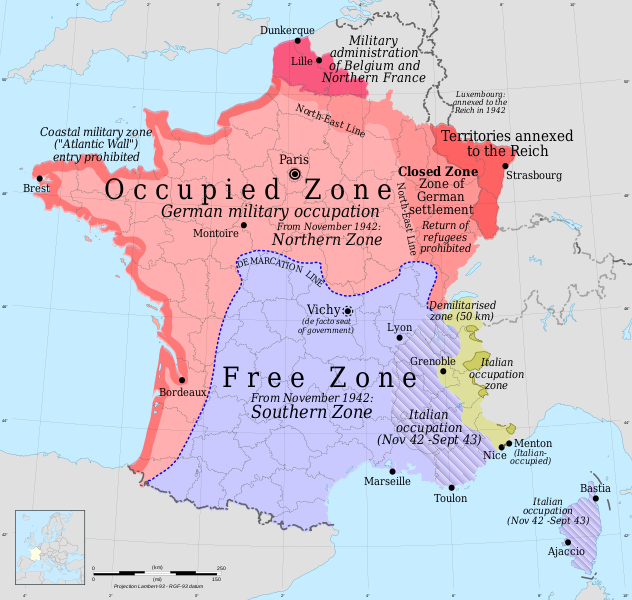
Since the German dictated Armistice Agreement does not say anything about annexing French territories to the Reich, therefore it didn't happen, right?
And since the Armistice Agreement says nothing about a Zone of German settlement, where return of French refugees was prohibited, that didn't happen either, right?
And since it said nothing about the areas of military administration in Belgium and Norther France, those also didn't happen, no doubt.
Or the Atlantic Wall zone, "entry prohibited," --
just like Sergent Schultz on Hogan's Hero's: "I see N O T H I N G." ;-)
Find something better than Wikipedia, and I’ll be happy to read it.
In the meantime, we can all celebrate how Roosevelt threw out the welcome mat to the Jews on the St. Louis, before they chose to seek refuge in the low countries.
Do you seriously deny that Hitler carved up France, confiscating whatever resources and territories he wanted, including hundreds of thousands of French slave laborers, and that's not even to mention the Jews?
Really, any suggestion that Hitler's treatment of France was somehow "fair" or "just" is ludicrous -- except, of course, in contrast to his genocide in Poland or elsewhere in the East.
And if you will not accept the word of Wikipedia on this, then I'd be curious to learn which historical "authorities" you do believe?
PAR35: "In the meantime, we can all celebrate how Roosevelt threw out the welcome mat to the Jews on the St. Louis, before they chose to seek refuge in the low countries."
Mark my words carefully on this: During that period, and for the only time in American history, the vast majority of refugees landing here were Jews.
Roosevelt did everything he legally could to increase that number, and to find other homes for those who could not reach America.
But he was highly restricted by both Congress and entrenched interests in the State Department, some of whom lied to him, exaggerating their efforts.
American anti-Semitism of that era can in no-way be compared to Nazi Germany, but it did exist to the point of restricting numbers who could legally enter.
The St. Louis incident happened in May 1939 -- months before Hitler's invasion of Poland, before any declarations of war, and a full year before Hitler's invasion of western Europe.
As a result of American officials' efforts:
At the time all appeared to be safe from Hitler's persecution -- which did not then include genocide.
Years later, after overrunning Holland, Belgium and France, Nazis murdered 254 of the St. Louis Jews.
So, in what sense was this Roosevelt's fault?
"In 1993 Gustav Schröder was posthumously named as one of the Righteous Among the Nations at the Yad Vashem Holocaust Memorial in Israel in recognition of his heroism in finding safe haven for his passengers on the MS St. Louis."
Contemporary German documentation; legitimate academic publication; researched and documented popular press; Other material to be evaluated on a case by case basis. Poor quality wartime or postwar propaganda not accepted, nor are maps drawn for Wikipedia publication.
I looked to see if the Wikipedia material was properly sourced (some is) before questioning you, but this looked to be home cooked garbage.
You didn't look very hard. Go back and check again:
Look at the bottom. There you will find:


Please read the article in full, then tell us which parts you find not credible.
Show me where the article, as it exists now, says that the Germans annexed their former lands. This? “except for Alsace-Lorraine, a disputed territory which was placed under German administration (though not formally annexed).” Oops, no, that says the exact OPPOSITE of what your map does. (You can jump in and do a quick edit on the text, but that won’t make the annexation claim any more factual.)
The map is garbage, whatever language it is in.
And footnotes dealing with other aspects of the occupation are totally irrelevant. Point me to sources showing annexation.
Response:
From the Vichy France article, Overview:
From "Vichy's racial policies and collaboration"
"Natzweiler included a gas chamber which was used to exterminate at least 86 detainees (mostly Jewish) with the aim obtaining a collection of undamaged skeletons (as this mode of execution did no damage to the skeletons themselves) for the use of Nazi professor August Hirt."
And from this History of Alsace-Loraine:
From same Alsace-Lorraine article: World War II:
"About 130,000 young men from Alsace-Lorraine were also drafted or volunteered to serve in the German Wehrmacht or the Waffen-SS during the Second World War, mostly on the eastern front (40,000 of them were killed or missing in action).
This led to numerous problems and recriminations after the war.
The tong-term historical context here is that Alsace-Lorraine was annexed, un-annexed, re-annexed and re-un-annexed -- several times over the centuries.
The most recent annexation was by Germany in 1940, though some sources, instead of using the word "annexed," merely say it was "administered from Berlin."
Is there a practical distinction to be made between "annexed" and "administered from Berlin"?
Among the ways we can see that Nazis treated Alsace-Lorraine as their own territory include:
Finally, you seem to be highly sensitive to this particular word "annexed," and to any legalistic distinctions regarding it.
Can you explain why?
Yes. Words have meaning. Some folks can make a living making sure that the correct word is used.
Disclaimer: Opinions posted on Free Republic are those of the individual posters and do not necessarily represent the opinion of Free Republic or its management. All materials posted herein are protected by copyright law and the exemption for fair use of copyrighted works.